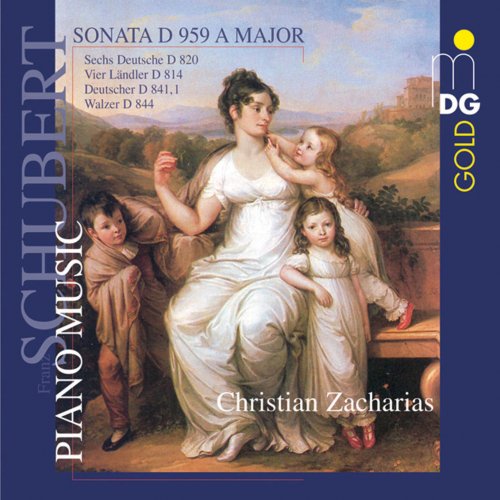
Christian Zacharias - Schubert: Piano Music, Sonata D 959 A Major (2007)
BAND/ARTIST: Christian Zacharias
- Title: Schubert: Piano Music, Sonata D 959 A Major
- Year Of Release: 2007
- Label: Musikproduktion Dabringhaus und Grimm (MDG)
- Genre: Classical Piano
- Quality: flac lossless (tracks)
- Total Time: 00:56:14
- Total Size: 168 mb
- WebSite: Album Preview
Tracklist
01. Sonata in A Major, D 959: I. Allegro
02. Sonata in A Major, D 959: II. Andantino
03. Sonata in A Major, D 959: III. Scherzo. Allegro vivace-Trio. Un poco più lento-Scherzo da capo
04. Sonata in A Major, D 959: IV. Rondo. Allegretto
05. Sechs Deutsche, D 820
06. Vier Ländler, D 814
07. Deutscher in F Major, D 841, 1
08. Walzer in G Major, D 844
This superb recording stands out from the crowd of reinterpretations of the three masterful piano sonatas from the end of Schubert's life. It is part of a group that contains many of them -- the group that attempts to strip away the veneer of innocence from Schubert and rediscover him as an intense, inward, rather experimental figure awed by Beethoven's achievements in much the same way as was Brahms. Yet it transcends the great majority of the available recordings of the Piano Sonata in A major, D. 959, in whatever style, with its sheer musicality. There is a great deal of detail in Zacharias' performance -- hear the tension generated in the sonata's opening bars as the pianist atomizes it into a sequence of small events, with those occurring in the left hand given equal weight with those in the right. The balance between the hands is exquisitely controlled through the entire movement, and the way Zacharias manages to fuse what seems like a progression of sudden impulses into a larger framework is nothing short of miraculous. Yet the real triumph comes in the Andantino second movement, where Zacharias has to set up a contrast on a larger scale between a melancholy but calm F sharp minor melody in the outer sections and an extraordinary outburst of passion in the central section -- one that subsumes an improvisatory free flow of emotion within a strict development of ideas in a way matched only in the late sonatas of Beethoven himself. It is not that Zacharias does anything radical, just that the impact of each part of the structure is calculated for its maximum effect. The return of the F sharp minor melody, imbued with echoes of the trauma it has been through, has rarely indeed been done with such a sense of heightened awareness. The sensitivity to detail continues through the two final movements and the four small dances that close the album and bring the listener back to earth after an extraordinary journey to the center of the soul. Zacharias' earlier recording of the Piano Sonata in A major, D. 959, offers fascinating comparisons with this disc, but its sound environment cannot compare with the dizzying palette of sounds offered by MDG's ingenious engineers.
01. Sonata in A Major, D 959: I. Allegro
02. Sonata in A Major, D 959: II. Andantino
03. Sonata in A Major, D 959: III. Scherzo. Allegro vivace-Trio. Un poco più lento-Scherzo da capo
04. Sonata in A Major, D 959: IV. Rondo. Allegretto
05. Sechs Deutsche, D 820
06. Vier Ländler, D 814
07. Deutscher in F Major, D 841, 1
08. Walzer in G Major, D 844
This superb recording stands out from the crowd of reinterpretations of the three masterful piano sonatas from the end of Schubert's life. It is part of a group that contains many of them -- the group that attempts to strip away the veneer of innocence from Schubert and rediscover him as an intense, inward, rather experimental figure awed by Beethoven's achievements in much the same way as was Brahms. Yet it transcends the great majority of the available recordings of the Piano Sonata in A major, D. 959, in whatever style, with its sheer musicality. There is a great deal of detail in Zacharias' performance -- hear the tension generated in the sonata's opening bars as the pianist atomizes it into a sequence of small events, with those occurring in the left hand given equal weight with those in the right. The balance between the hands is exquisitely controlled through the entire movement, and the way Zacharias manages to fuse what seems like a progression of sudden impulses into a larger framework is nothing short of miraculous. Yet the real triumph comes in the Andantino second movement, where Zacharias has to set up a contrast on a larger scale between a melancholy but calm F sharp minor melody in the outer sections and an extraordinary outburst of passion in the central section -- one that subsumes an improvisatory free flow of emotion within a strict development of ideas in a way matched only in the late sonatas of Beethoven himself. It is not that Zacharias does anything radical, just that the impact of each part of the structure is calculated for its maximum effect. The return of the F sharp minor melody, imbued with echoes of the trauma it has been through, has rarely indeed been done with such a sense of heightened awareness. The sensitivity to detail continues through the two final movements and the four small dances that close the album and bring the listener back to earth after an extraordinary journey to the center of the soul. Zacharias' earlier recording of the Piano Sonata in A major, D. 959, offers fascinating comparisons with this disc, but its sound environment cannot compare with the dizzying palette of sounds offered by MDG's ingenious engineers.
As a ISRA.CLOUD's PREMIUM member you will have the following benefits:
- Unlimited high speed downloads
- Download directly without waiting time
- Unlimited parallel downloads
- Support for download accelerators
- No advertising
- Resume broken downloads


